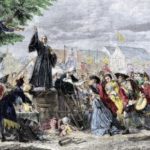This lesson traces the rise of Abraham Lincoln from his humble beginnings to the presidency. It examines Lincoln’s ideas and decisions regarding slavery and the use of presidential power to preserve the Union during the Civil War. After the lesson, students should be able to explain how Lincoln overcame daunting disadvantages to become a great president, analyze and evaluate his decisions in response the critical constitutional issues of the Civil War, and understand and appreciate his legacy to American constitutionalism and citizenship.
Understanding Democracy: A Hip Pocket Guide
This guide, written by John J. Patrick, explains the core concepts of democracy in a clear A-Z format. The complete book is available for download.
American Legal History: Colonial Era to 1800
Larry Kramer, former Dean of Stanford Law School and constitutional scholar, discusses American legal history, beginning with Marbury v. Madison.
The Great Awakening

This short video examines the flurry of religious expression which spread throughout the colonies during the 1740’s and 1750’s. Led by individuals such as George Whitfield and Jonathan Edwards, the Great Awakening cut across racial, class, and geographic barriers to create an incipient sense of nationalism. Professor Jeffry Morrison contends that the popular religiosity of this movement contributed directly to the popular constitutionalism of the 1770’s.
Reconstruction and The American Founding
Explore primary source documents in the ConSource digital library to see how the provisions of the 13th, 14th, and 15th amendments are connected to the issues and debates discussed during the revolutionary and constitutional periods.